Unearthing Innovation from Deep Southern Roots
By: Victor “Vic” R. Donald, P.E., Senior Consultant (Terracon)
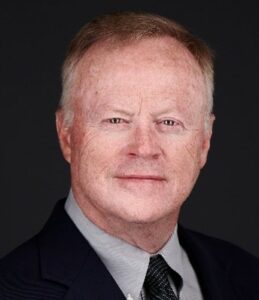 I have strong Southern roots that spread across three states – Mississippi, Alabama, and Louisiana. My family was in a new place every two or three years, due to my dad’s job at a natural gas pipeline company. That kind of childhood forced me – a young introvert – to continually adapt and make friends. I felt that survival demanded that I become more outgoing in those junior high and high school years, especially. I gained a tremendous appreciation for the deep South, and I feel blessed to have those Southern roots.
I have strong Southern roots that spread across three states – Mississippi, Alabama, and Louisiana. My family was in a new place every two or three years, due to my dad’s job at a natural gas pipeline company. That kind of childhood forced me – a young introvert – to continually adapt and make friends. I felt that survival demanded that I become more outgoing in those junior high and high school years, especially. I gained a tremendous appreciation for the deep South, and I feel blessed to have those Southern roots.
As a teenager, I started working for a bridge manufacturer and it was during this time I discovered my calling for engineering. I encountered engineers on the job and started to learn about the complexities of civil infrastructure and how much goes into it. My initial aspiration was to be a structural engineer, but an inspiring talk by a geotechnical engineer named John Grosch redirected my path.
John informed me and my classmates in our first geotechnical course about what it means to be a geotechnical engineer and two things he said stick with me to this day. One was, “You’re going to have to continue to get dirty because we deal with soils in every way, including on our clothes.” And the second was, “You’re going to need a graduate degree.” The first one I was good at – I’d been getting dirty since I was a kid. But the second one intimidated me.
I dove into both. I stayed in college at Louisiana State University and  got my Master of Science in Civil Engineering, while working in the soils lab, behind drill rigs, and on construction sites. I went to work for a local geotechnical practice in Baton Rouge while in grad school. Those were two of the hardest and perhaps the most educational years of my life. I was learning from great mentors at work and would take questions back to the classroom. Those experiences gave me a jump start at being a businessman in the geotechnical profession.
got my Master of Science in Civil Engineering, while working in the soils lab, behind drill rigs, and on construction sites. I went to work for a local geotechnical practice in Baton Rouge while in grad school. Those were two of the hardest and perhaps the most educational years of my life. I was learning from great mentors at work and would take questions back to the classroom. Those experiences gave me a jump start at being a businessman in the geotechnical profession.
With that jump start, I didn’t waste too much time starting my own business. When I was 28, I ventured into a partnership with a firm out of Mississippi and launched an operation in Baton Rouge. I sought out people that I needed to learn from—not just engineers; I learned from bankers, attorneys, and accountants. It all came together in that practice.
Early in my career, I recognized the value of collaboration within the industry. I became involved with GBA (at the time, ASFE) and attended their conferences, immersing myself in a community of like-minded professionals. GBA has taught me that there is a great coalition of people out there that are looking out for the best interest of the profession. I support that in any way that I can.
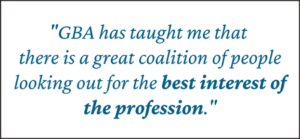
Over the years, I bought, sold, and merged companies as I navigated the dynamic landscape of the geoprofession, eventually becoming president of Aquaterra Engineering, a firm that traversed the paths of my childhood, practicing throughout the south. In 2009, after much consideration, we decided to merge our rapidly growing practice into Terracon’s. I like to call it the second-best decision I ever made, with my proposal to my wife of 44 years being the first.
Throughout my career, my gift, and perhaps my fault, could be described as my insatiable desire to innovate. I always wanted to find a better way to approach our work. As I experienced success with innovation, I began to use such ideas to differentiate our practice and help overcome the commoditization that threatens our profession. Terracon allowed me to ask questions, explore ideas, and invest in innovation, and I’m continuing that as a senior innovation consultant with the firm.
Advice to Those Entering the Geoprofessions
There is a lot of change going on right now in the geoprofessions. I’ve seen more change in our profession in the last four years than I saw in the entire first 40 years of doing this. Discovering data, digitization of our services, the rise of geotechnical specialty contractors, the impact of artificial intelligence—just dramatic, quick change that leaves one breathless. So, when I’m talking to a young professional, I’m saying, “You can thrive in change or you can suffer in change. And it’s your choice. Be proactive and run TO the change and be a part of making it work in a way that serves you, your profession, and your clients well.” That benefits the profession and the individual.
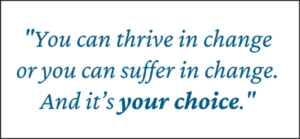
I’d tell them, “Think about being a coder and what it means to code in the geotechnical practice. Think about discovering data science, machine learning and artificial intelligence, and maybe go back to school and get that type of education instead of an MBA. GBA can give you the business acumen to understand how to run a business or how to be a strong principle in a business.”
Family and Hobbies
My wife, Diana, comes to as many GBA events as she can. That has been one of the 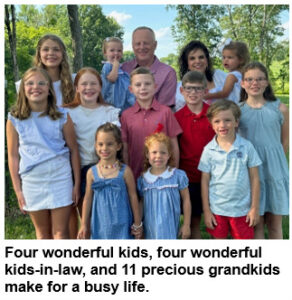 highlights of my profession – being able to enjoy these professional experiences and colleagues with her, share in conversations, and even plan trips together.
highlights of my profession – being able to enjoy these professional experiences and colleagues with her, share in conversations, and even plan trips together.
We have four kids – three boys and a girl, none of whom decided to be engineers, but all went into professions that have allowed frequent dialogue about many of the key aspects of the geoprofession.
Something we all enjoy as a family is LSU athletics. I’m amazed how sports brings people together. We’re all LSU grads and we have a group chat that blows up during the games. We just followed the College World Series together, for example.
I miss the days of working with the drill rig, and all the perils of that work. I suppose that’s why hiking is a favorite hobby of mine and that’s why I moved to Nashville. I like to spend time in the hills and valleys of the Appalachian Mountains and plan to do more of that.
Closing Thoughts
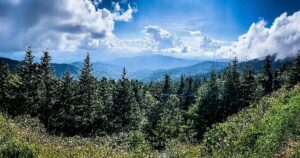 I’m known to complain about commoditization, our fees being too low, and that it’s not worth the risks we take, etc. But, complaints aside, when I look back, I have to think, “I’ve been blessed financially, socially, and creatively by a profession that recognizes and rewards good work delivered with an innovative mindset.”
I’m known to complain about commoditization, our fees being too low, and that it’s not worth the risks we take, etc. But, complaints aside, when I look back, I have to think, “I’ve been blessed financially, socially, and creatively by a profession that recognizes and rewards good work delivered with an innovative mindset.”
As I continue to explore new horizons and contribute in innovative ways to our profession, I look forward to witnessing the continued evolution of our practice and supporting the next generation of professionals in embracing the challenges and opportunities that lie ahead.